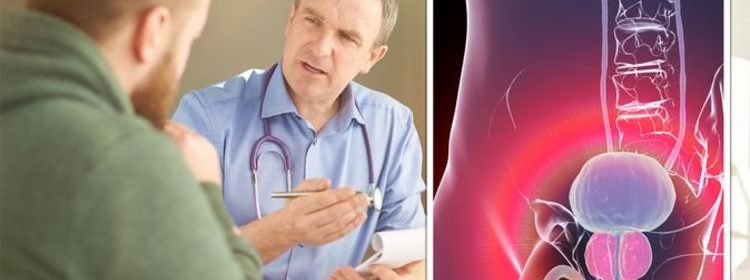Prostate cancer symptoms: What are the early signs of prostate cancer?

Bill Turnbull urges men to ‘press your GP’ on prostate cancer
We use your sign-up to provide content in ways you’ve consented to and to improve our understanding of you. This may include adverts from us and 3rd parties based on our understanding. You can unsubscribe at any time. More info
Prostate cancer has few symptoms, meaning for many men they won’t realise there is an issue until the cancer begins to spread. In order to avoid this, here’s how to assess your risk for prostate cancer, and when to speak to your doctor.
Prostate cancer is the most common cancer for men in the UK, with almost 50,000 men being diagnosed every year, an average of 129 per day.
Before James Michael Tyler, the actor most famous for his role as barista Gunther in Friends, sadly died from prostate cancer and had spent time campaigning to raise awareness of the disease.
The actor had urged men to get their prostate checked regularly, and in the statement confirming Mr Tyler’s death, his manager wrote: “wanting to help as many people as possible, he bravely shared his story and became a campaigner for those with a prostate to get a… blood test as early as 40-years-old.”
At the moment, guidelines in the UK say men over 50 are at higher risk of prostate cancer, but there is no screening programme in place.


Instead, if you have concerns, or are at higher risk of prostate cancer, you are advised to speak to your GP.
If you talk to your GP and they agree you should have a prostate test, there are a variety of different tests.
Your GP is likely to test your urine to rule out other causes, a digital rectal examination – which is where the doctor feels your prostate to check for enlargement – and possibly a blood test.

What are the symptoms of prostate cancer?
According to prostate cancer UK, most men don’t spot early signs or symptoms of prostate cancer.
This is largely due to how prostate cancer develops.
Some people may experience changes to the way they wee if the cancer growth develops near the urethra.
DON’T MISS:
Vitamin D deficiency: The sign on your head [UPDATE]
Pancreatic cancer symptoms: A sign when you go to the toilet of the… [INSIGHT]
High cholesterol: Five warning signs in your legs [TIPS]

However, for many, the cancer grows on the outer part of the prostate, meaning it doesn’t cause any noticeable symptoms until it begins to spread.
Noticing changes in the way you urinate – for example developing a weak flow, feeling as though you aren’t fully emptying your bladder, or urinating more often – the cause is normally a less serious problem.
A common cause for issues with your wee is an enlarged prostate, which is not a symptom of prostate cancer.
A common cause for issues with your wee is an enlarged prostate, which is not a symptom of prostate cancer.
When prostate cancer begins to spread, some might experience the following symptoms:
- Back pain, hip pain or pelvis pain
- Problems getting or keeping an erection
- Blood in the urine or semen
- Unexplained weight loss
These symptoms can be caused by other health conditions, but if you start experiencing any of them you should speak to your doctor to rule out prostate cancer.
How do you know if you have prostate cancer?
Because so many men don’t experience any symptoms of prostate cancer, it’s even more important you see your doctor and regularly have your prostate checked.
You can’t check your prostate yourself, it must be done by a doctor.
Prostate Cancer UK says you are at increased risk of developing prostate cancer if you’re over the age of 50, if you have a family history of prostate cancer or if you are black.
You can use their risk checker online tool here.
Source: Read Full Article